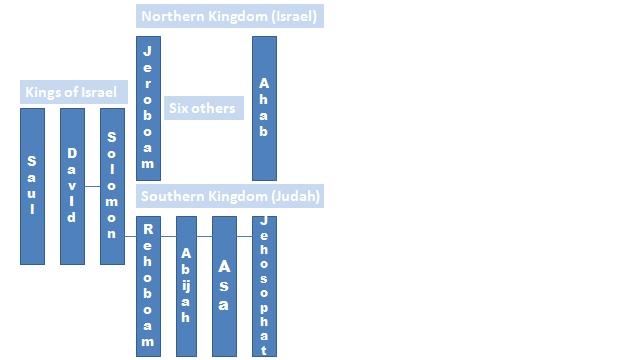
2 Chronicles 17-20
(Jehosophat's Journey)
May 9th
Produced by The Listening for God Ministry
Copyright 2016
Click here for a print- friendly version
Please refer to one or more Bible versions of your choice to read this section. We recommend that you read at least two versions for added understanding. For your convenience, we have provided six links below, each of which takes you directly to today's chapters in a specific version:
Bible Gateway
Key Verse
The LORD was with Jehoshaphat, for he walked in the earlier ways of David his father, and did not seek the Baals. Summary of Chapters
Jehosophat’s journey of faith is recorded in chapters 17-20. He was the successor to Asa and a descendent of David. His journey included high points in spirituality and leadership, but he descended to low points of ill-advised relationships. However, like his ancestor David, he was quick to repent when he realized his mistakes and is honored at the end of his life.
“LORD, the God of our ancestors, are you not the God who is in heaven? You rule over all the kingdoms of the nations. Power and might are in your hand, and no one can withstand you. Our God, did you not drive out the inhabitants of this land before your people Israel and give it forever to the descendants of Abraham your friend? They have lived in it and have built in it a sanctuary for your Name, saying, ‘If calamity comes upon us, whether the sword of judgment, or plague or famine, we will stand in your presence before this temple that bears your Name and will cry out to you in our distress, and you will hear us and save us.’
The LORD responded with a message delivered through one of the Levites, and promised victory if they follow his commands. The LORD delivered the enemy by turning them against each other. Reflection and Application
Alliances with evil people may seem convenient or necessary at times, but eventually lead to trouble. The account of Jehosophat served as a reminder of this danger to the original audience of the book, the Judeans returning from exile. In the New Testament, Paul delivers a similar reminder to his churches in Corinthe, when he writes:
Don't become partners with those who reject God. How can you make a partnership out of right and wrong? That's not partnership; that's war. Is light best friends with dark? Does Christ go strolling with the Devil? Do trust and mistrust hold hands? Who would think of setting up pagan idols in God's holy Temple? But that is exactly what we are, each of us a temple in whom God lives.
We are encouraged to associate with unbelievers so that we can seek to share the word and inspire them. However, the danger arises when we form an alliance where the parties have different goals. This risk occurs in individual relationships and in geopolitics.
Jesohophat demonstrated the wisdom of his forefathers David and Solomon when he sought the LORD’s guidance, as in the account from chapter 20. We also demonstrate wisdom when we seek God’s advice. However, if we seek his advice, then shouldn’t we follow it, whether we agree or not? When sitting with Ahab, Jehosophat requested a real prophet, who delivered the word of God, but then he did not follow that word, and almost lost his life as a consequence. Let's remember Jehosophat's experience and try to avoid that mistake.
Questions and Prayers for Further Reflection
Looking Ahead
Tomorrow's reading: 2 Chronicles 21-24 (Evil Begets Evil)
2 Chronicles 17-20 (King James Version - KJV)
2 Chronicles 17-20 (New Revised Standard Version - NRSV)
2 Chronicles 17-20 (New International Version - NIV)
2 Chronicles 17-20 (The Message - MSG)
US Conference of Catholic Bishops
2 Chronicles 17 (New American Bible - NAB) (click next chapter for chapters 18-20)
British Bible Society
2 Chronicles 17 (Good News Bible - GNB) (click next for chapters 18-20)
- 2 Chronicles 17:3 (NAB)
Chapter 17 notes that Jehosophat “followed the ways of his father David (2 Chron 17:3 - NIV)” because he worshipped God and not the fake idols collectively known as Baals. Jesophat sought to revitalize knowledge of scripture, proper worship, and justice. He organized a Spiritual Formation Team consisting of priests, Levites, and lay people to provide religious education to the people of Judah. Note that they brought with them the “Book of the Law of the LORD (17:9 - NIV)” as the authoritative source. During this time the country prospered and received gifts from other nations, but Jehosophat was only one chapter of his life away from a bad decision.
In chapter 18 we learn that Jehosophat formed an alliance with Ahab, the king of Israel, by allowing the marriage of his son to Ahab’s daughter. This may have seemed to be an honorable act of fellowship to their cousins to the north, but it was actually an unhealthy alliance with an idol-worshipping, self-absorbed evil king.
The true nature of Ahab was revealed when he asked Jehosophat to join him in attacking their neighbor. Ahab’s prophets-for-hire endorsed this decision - just as they did with everything else their king said. Jehosophat was wise enough to ask for a true prophet, but was not courageous enough to act based on the real prophet’s statement. The prophet Micaiah warned both kings not to go to war, but they ignored him. Jehosophat should have realized that he had a false ally when Ahab told him to dress up like a king while Ahab was disguised as an ordinary soldier. Despite this attempted ruse, Ahab was killed (as prophesized) and Jehosophat narrowly avoided death – due to God’s grace.
When Jehosophat returned to Judah he got himself and the nation back on track by re-establishing a system of judges to ensure the administration of proper and equal justice across the land, as noted in chapter 19.
Chapter 20 gives an account of an over-powering alliance of nations that were mustering for war against Judah. This time Jehosophat turned to the best ally possible – the LORD:
- 2 Chronicles 20:6-9 (NIV)
The story of Jehosophat’s spiritual journey ends with a note of two additional transgressions. He had eliminated many of the “high places (idol worship centers)” but had not eliminated all. He also formed another ill-advised alliance in a ship-building venture, but the LORD squashed that one too. All-in-all, he was a good king with some faults, but was remembered with honor.
- 2 Corinthians 6:14-16 (MSG)
The United States and other countries have had historical and recent experiences of forming partnerships with other nations that are less than ideal, but are assumed to be worth the risk to achieve broader goals. But these partnerships almost always have proven to create more problems than benefits. Why? Because the two countries had different goals.

How did you like the snarky exchange between the prophet Micaiah and Ahab in chapter 18, verses 14-27? One of the joys of a trek through the Bible is the discovery of overlooked gems like this that are tucked away in books of the Old Testament. It’s like finding a beautiful flower in the middle of a long hike through a forest. Anyone who says the Old Testament is dry and dusty has not yet come across these hidden blossoms. The next time you hear that objection be prepared to share this story or some other passage that exhibits the rich literary nature of the Bible.
Micaiah was not the first truth-teller to be falsely imprisoned and would not be the last. This type of persecution is part of the sacrifice for some followers of the LORD. We will see more of this in the Old and New Testament and will continue to see it in our lifetimes. God provides us with ultimate protection, but there may be pain and suffering that his followers experience on earth until the final day of justice.
Related Questions
Recommended Prayer
Father in heaven, you are the best partner for us. We confess to forming alliances with the wrong parties at times. Please help us to seek you first in prayer and study of your word.
Suggested Prayer Concerns
Those falsely imprisoned
Comments and Questions
If you have comments or questions, please add them to our Comments page, email to the author at
ted@listeningforGod.org,
or share your comments or questions via the Listening for God Twitter account